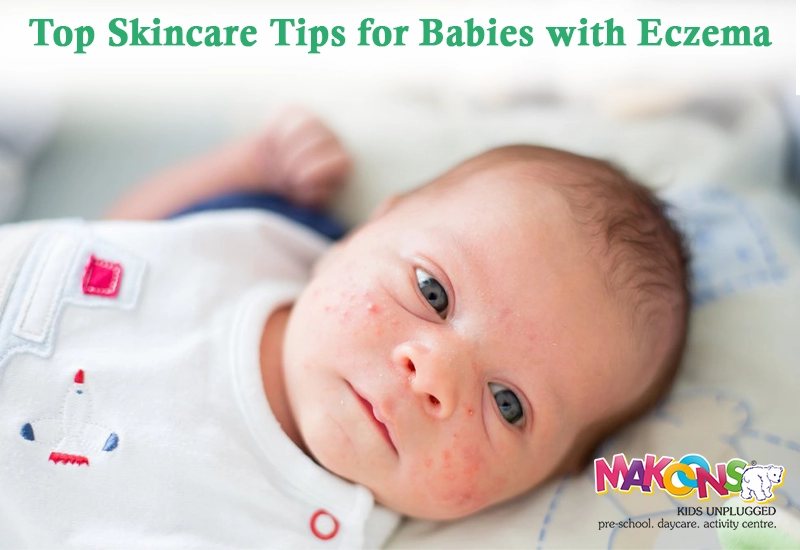Millions of newborns worldwide suffer from the widespread skin disorder eczema, sometimes known as atopic dermatitis. For both parents and children, it can be upsetting with red, dry, itching areas. Although there is no clear solution, good skincare will greatly help to control flare-ups and maintain the peaceful and healthy state of your baby’s skin.
Top skincare recommendations for babies with eczema will be discussed in this blog covering natural cures, professional advice on gentle and safe treatment of baby eczema, and useful baby eczema treatments.
Understanding Baby Eczema
Understanding what eczema is before delving into skincare advice is vital. Usually beginning in the first six months, eczema in infants first shows up on the face, scalp, arms, and legs. The skin grows cracked, irritated, and swollen. Environmental causes, allergies, strong soaps, or even stress could aggravate it.
Baby skincare aims to maintain the strong skin barrier, seal in moisture, and steer clear of recognized irritants.
1. Get Moist : Regularly and Generously
- Consistent moisture is among the best newborn eczema remedies available.
- Apply a hypoallergenic, fragrance-free moisturizer.
- Apply at least twice a day, particularly following bathing when the skin is still damp.
- Look for ointments or creams instead of lotions since they are thicker and better at sealing in moisture.
For irritated newborn skin, pro tip: ingredients including shea butter, colloidal oatmeal, and ceramides help.
2. Give Luke Not Hot But Rather Warm Baths
Although everyday bathing your kid is okay, the temperature counts.
- Use lukewarm water and restrict bath duration to ten to fifteen minutes.
- To provide even more relaxation, toss the bath with natural calming ingredients as oatmeal powder.
- Immediately following the bath, always hydrate to stop water loss.
- Steer clear of perfumed goods and bubble baths since they aggravate baby eczema.
3. Select Mild, Fragrance-Free Items
Regarding advice on newborn skincare, selecting the correct items is quite vital.
- Apply a gentle, soap-free cleanser.
- Search for labels declaring “eczema-friendly,” “hypoallergenic,” or “for sensitive skin.”
- Steer clear of goods including alcohol, scent, preservatives, or colors.
- Reducing irritation in your infant depends on keeping her skin free from needless toxins.
4. Treat Baby Eczema Using Natural Remedies
Many parents search for natural solutions for infant eczema to go along with prescribed treatment. These are some reasonable, mild choices:
a. Coconut Oil
- contains anti-inflammatory and antibacterial qualities.
- After moistening, thinly cover the impacted region.
b. Aloe Vera
- Aloe vera gel can help to calm irritated skin.
- Only use natural, preservative-free models.
c. Baby Breast Milk
- Applying breast milk has been found in studies to be as successful as hydrocortisone in mild eczema sufferers.
- Before using new treatments, always complete a patch test and see your pediatrician.
5. Dress Your Baby with Soft, Breathable Textures.
Your baby’s skin condition may be improved or worsened by your wardrobe choices.
- Choose entirely cotton clothing.
- Steer clear of synthetic or wool products that could aggravate skin conditions.
- Using fragrance-free, mild detergent, wash newly bought clothing before wearing.
Check also that the infant is not overdressed. One can start eczema flare-ups by sweating.
6. Keep Nails Short and Avoid Scuffing.
Eczema can be quite itchy, and newborns sometimes scratch without thinking about it, aggravating the skin or increasing susceptibility to infection.
- Keep the nails on your newborn cut.
- If necessary—particularly at night—use soft cotton mitts.
- During flare-ups, divert the infant with toys, blankets, or comforting music.
Scratching can damage skin, hence mild avoidance is rather important.
7. Control Environmental Triggers
Finding and avoiding triggers will enable one to better manage newborn eczema treatment.
Common Triggers:
- Dry air (particularly in winter)
- Pet dander or mites in dust.
Particles
- Some foods, should your infant be starting solids—
- To keep indoor air wet, use a humidifier; also, routinely vacuum to help to lower allergies.
8. Exercise Caution with Novel Foods for Older Babies
If your infant is consuming solids, monitor any flare-ups of eczema following the addition of a new meal.
Typical Food Triggers Related to Eczema:
- In eggs
- Diary
- Almonds
- So, Soy
One new food at a time, gently introduce them and track reactions. If eczema seems connected to food, discuss allergy testing with your pediatrician.
9. Maintaining a Skincare Routine Will Help
Treatment for newborn eczema calls for consistency.
- Cleanse, hydrate, and check daily.
- Steer clear of often changing items.
- Keep up a morning and evening skincare routine.
- This promotes skin healing, hydration, and over time resilience building.
10. See a Pediatric Dermatologist as Needed
See a doctor if over-the-counter and home treatments skincare isn’t helping.
- Severe flare-ups could call for prescription creams such as low-dose corticosteroids or non-steroidal anti-inflammatory ointments.
- Based on the age and condition of your kid, doctors can help you determine how safely to treat baby eczema.
- Never apply adult eczema creams to infants unmonitored by a doctor.
Also Read – Newborn Skin Care: Preventing Rashes, Dryness, and Infections
Final Thoughts
Babies’ eczema management calls for consistency and careful treatment as well as patience. Although eczema may not go away overnight, good skincare will help to control it and make your kid far more comfortable.
From selecting the appropriate moisturizer to applying natural cures for newborn eczema, every action you do significantly affects the state of affairs in your infant.
These infant skincare ideas can help you create a calming daily regimen that shields sensitive baby skin and lessens the frequency and intensity of eczema flare-ups.
FAQs
Q.1 Is baby eczema communicative?
Eczema is not communicable, though. Genes and environmental causes define this skin disorder.
Q.2 Can permanent cure for baby eczema be achieved?
Though many newborns outgrow eczema with age, there is no permanent solution. Trigger control and good skincare go quite far.
Q.3 When should I see a doctor?
See a doctor or dermatologist if the eczema worsens, causes open sores, or does not respond to simple skincare.


